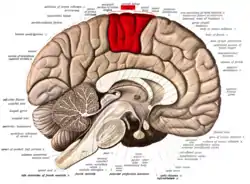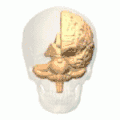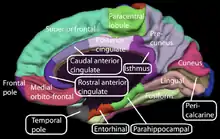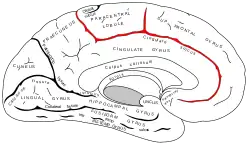Paracentral lobule
Paracentral lobule is on the medial surface of the hemisphere and is the continuation of the precentral and postcentral gyri. The paracentral lobule controls motor and sensory innervations of the contralateral lower extremity. It is also responsible for control of defecation and urination.
| Paracentral lobule | |
|---|---|
 Medial surface of left cerebral hemisphere. (Paracentral lobule is shown in red.) | |
 Medial view of a halved human brain (Paracentral lobule labeled at top center, in blue.) | |
| Details | |
| Identifiers | |
| Latin | lobulus paracentralis |
| NeuroNames | 1341 |
| TA98 | A14.1.09.209 |
| TA2 | 5466 |
| FMA | 77534 |
| Anatomical terms of neuroanatomy | |
It includes portions of the frontal and parietal lobes:[1]
- The anterior portion of the paracentral lobule is part of the frontal lobe and is often referred to as the supplementary motor area.
- The posterior portion is considered part of the parietal lobe and deals with somatosensory of the distal limbs.
While the boundary between the lobes, the central sulcus, is easy to locate on the lateral surface of the cerebral hemispheres, this boundary is often discerned in a cytoarchetectonic manner in cases where the central sulcus is not visible on the medial surface.
Function
Neurons in paracentral lobule are concerned with:
Blood supply
It is supplied by branches of the anterior cerebral artery.
Applied anatomy
Damage of paracentral lobule occurs from occlusion of anterior cerebral artery. Characteristic manifestations include:
- Contralateral lower limb muscle weakness
- Urinary incontinence
Gallery
 Animation. Paracentral lobule is shown in red.
Animation. Paracentral lobule is shown in red. Medial view of a human right cerebral hemisphere. Paracentral lobule is labeled at top center, in green.
Medial view of a human right cerebral hemisphere. Paracentral lobule is labeled at top center, in green. Medial view of a human right cerebral hemisphere. Paracentral lobule is labeled at top center, in blue.
Medial view of a human right cerebral hemisphere. Paracentral lobule is labeled at top center, in blue. Cingulate sulcus defines the boundaries of the paracentral lobule.
Cingulate sulcus defines the boundaries of the paracentral lobule. Marginal sulcus. It defines the posterior boundary of the paracentral lobule.
Marginal sulcus. It defines the posterior boundary of the paracentral lobule. Paracentral sulcus. It defines the anterior boundary of the paracentral lobule.
Paracentral sulcus. It defines the anterior boundary of the paracentral lobule. Central sulcus on the medial surface. It divides the paracentral lobule into the anterior part and the posterior part.
Central sulcus on the medial surface. It divides the paracentral lobule into the anterior part and the posterior part. Paracentral lobule, shown in the right cerebral hemisphere.
Paracentral lobule, shown in the right cerebral hemisphere.
References
- Neuroscience in medicine. Totowa, NJ: Humana Press. 2003. p. 348. ISBN 1-58829-016-6.
External links
| Wikimedia Commons has media related to Paracentral lobule. |